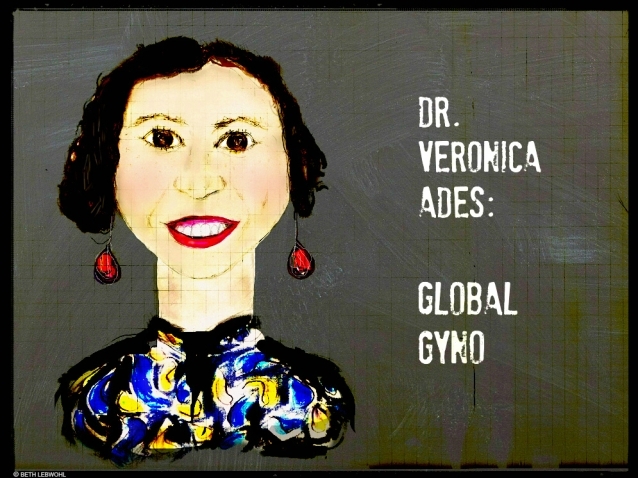Veronica Ades ’99 describes herself as a “vaginista extraordinaire,” but don’t let the cheeky moniker fool you. Ades is an accomplished OB/GYN currently on faculty at New York University’s School of Medicine who splits her time between the school of medicine’s EMPOWER clinic for victims of sexual trafficking and the New York VA Harbor Healthcare System. In February, she briefly left New York and traveled to South Sudan on behalf of Doctors Without Borders/Médecins Sans Frontières (MSF). She spoke to Beth Lebwohl ’00 about that, and more.
Your upcoming MSF mission won’t be your first: You spent a month in South Sudan in 2012. And that was preceded by a three-year stint doing maternal health work in Uganda. How does Africa’s maternal health care differ from that of the United States?
In the US, when women don’t have access to prenatal care, they might see a doctor for only a few visits, or they might only show up in labor. But in Uganda, a pregnant woman might show up [at a doctor’s] after no prenatal care at all and then pushing for 12 hours at home. In South Sudan, a woman might show up after two days of labor and then walking for another four days. Also, in the US, we don’t see a lot of death. In Uganda, I had to learn not get very upset when a baby died—the midwives didn’t even blink.
Was there a maternal-care experience you had abroad that was particularly difficult?
I saw one woman in Uganda who was raped by her brother, got pregnant from the rape, delivered the baby at home, then nearly bled to death when her placenta didn’t come out. She came to the hospital where I got the placenta out and discovered that her vagina had torn all the way to the rectum. I took her to the operating room and repaired her. Her mother then came to visit her in the hospital, and beat her in the vagina where I had repaired her to punish her for “tempting her brother.” Now, what I feel when I think of this girl is an intense, white-hot anger. She did not deserve anything that happened to her, and she had absolutely no power to do anything about it, nor did I.
That is a very difficult thing to have witnessed. It also speaks to the intimate nature of your work. Given that, has being an OB/GYN changed your view of human relationships and love?
What I do is fascinating to pretty much all women everywhere, whereas most men find it unappealing and want to run away. When I did my MSF mission, for example, storytelling was my catharsis, and people at the lunch/dinner table would often gather around me to listen to the details of that day’s case. Except for one guy, an MSF construction logistician. He would loudly complain that I was talking too much about vaginas. But, after a week, he was the first one at the table going, “Veronica, what did you do about the vaginas today?” It’s not about romantic love, but it just goes to show you that some people who are turned off by what I do can come around to it.
Tell us about your work treating victims of sex trafficking at Manhattan’s EMPOWER clinic.
People think sex trafficking is a problem in other countries, but they don’t realize that there is a huge slave trade right here in the United States—in [the borough of] Queens, for crying out loud. I also think that people can imagine that being sex trafficked is deeply traumatizing, but that it is also possible to be resilient and recover.
Can you give an example of a patient you saw recover from abuse of some kind?
I saw a patient who did not report domestic violence to me (they often don’t report it to doctors), but the next year she came back and told me her husband had been abusive and she put an end to it. I asked her how. She said that when she got here from Mexico, she realized that women [in New York] were empowered, that she was making her own money and didn’t have to take [it] anymore. And she called the police on her husband. After that, he never hit her again. She laughed and told me, “Ahora soy yo que la lleve los pantalones!” (“Now I’m the one who wears the pants!”). I loved it so much I wrote it on a sticky note and put it up in my office for, like, a year.
You’re about to leave New York, again, and head to Sudan with MSF for a month. What are your goals for the trip? What helps you as you travel?
My goals are just to reconnect with the essentials of being a doctor—basic, lifesaving medicine rather than the paperwork and bureaucracy that let us forget why we do it. What helps me is to know that when I’m blogging, that you are all reading along.
Ades’ blog can be found at blogs.msf.org/en/staff/blogs/love-labor-loss.
Part I in a series about alumnae whose lives and work take them around the globe. If you’d like to suggest an alum to profile, please email magazine@wellesley.edu.





We ask that those who engage in Wellesley magazine's online community act with honesty, integrity, and respect. (Remember the honor code, alums?) We reserve the right to remove comments by impersonators or comments that are not civil and relevant to the subject at hand. By posting here, you are permitting Wellesley magazine to edit and republish your comment in all media. Please remember that all posts are public.